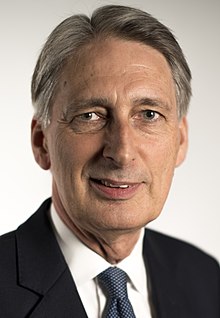Chancellor of the Exchequer
|
United Kingdom Chancellor of the Exchequer |
|
|---|---|

Arms of Her Majesty's Government
|
|

|
|
| Her Majesty's Treasury | |
| Style |
The Right Honourable (Formal prefix) Chancellor |
| Member of |
British Cabinet Privy Council National Security Council |
| Reports to | The Prime Minister |
| Residence |
11 Downing Street Westminster, London United Kingdom |
| Seat | Westminster, London |
| Appointer | The British Monarch on advice of the Prime Minister |
| Term length | No fixed term |
| Inaugural holder |
Hervey de Stanton (England only) |
| Formation | 22 June 1316 |
| Website | GOV |
The Chancellor and Under-Treasurer of Her Majesty's Exchequer, commonly known as the Chancellor of the Exchequer, is a senior official within the Government of the United Kingdom and head of Her Majesty's Treasury. The office is a British Cabinet-level position.
The chancellor is responsible for all economic and financial matters, equivalent to the role of or Minister of Finance in other nations. The position is considered one of the four Great Offices of State, and in recent times has come to be the most powerful office in British politics after the Prime Minister.
The Chancellor of the Exchequer is now always Second Lord of the Treasury as one of the Lords Commissioners for executing the office of Lord High Treasurer. In the 18th and early 19th centuries it was common for the Prime Minister also to serve as Chancellor of the Exchequer if he sat in the Commons; the last Chancellor who was simultaneously Prime Minister and Chancellor of the Exchequer was Stanley Baldwin in 1923. Formerly, in cases when the Chancellorship was vacant, the Lord Chief Justice of the King's Bench would act as Chancellor pro tempore. The last Lord Chief Justice to serve in this way was Lord Denman in 1834.
The Chancellor is the third-oldest major state office in English and British history; it originally carried responsibility for the Exchequer, the medieval English institution for the collection and auditing of royal revenues which dates from the Anglo-Saxon period and survived the Norman conquest of England. The earliest surviving records which are the results of the exchequer's audit, date from 1129–30 under King Henry I and show continuity from previous years. The Chancellor controlled monetary policy as well as fiscal policy until 1997, when the Bank of England was granted independent control of its interest rates. The Chancellor also has oversight of public spending across Government departments.
...
Wikipedia

